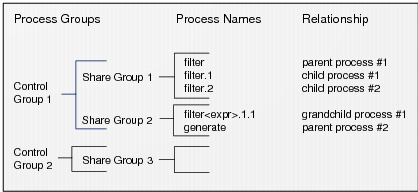When you debug a multi-process program, TotalView adds processes to both a control and a share group as the process starts. These groups are not related to either UNIX process groups or PVM groups. (See Chapter 2, “About Threads, Processes, and Groups” for information on groups.)
Because a program can have more than one control group and more than one share group, TotalView decides where to place a process based on the type of system call—which can either be fork() or execve()—that created or changed the process. The two types of process groups are:
The parent process and all related processes. A control group includes children that a process forks (processes that share the same source code as the parent). It also includes forked children that subsequently call a function such as execve(). That is, a control group can contain processes that don’t share the same source code as the parent.
Control groups also include processes created in parallel programming disciplines like MPI.
The set of processes in a control group that shares the same source code. Members of the same share group share action points.
|
|
See Chapter 13, “Using Groups, Processes, and Threads” for a complete discussion of groups.
|
TotalView automatically creates share groups when your processes fork children that call the execve() function, or when your program creates processes that use the same code as some parallel programming models such as MPI do.
TotalView names processes according to the name of the source program, using the following naming rules:
|
|
The name for forked child processes differs from the parent in that TotalView appends a numeric suffix (.n). If you’re running an MPI program, the numeric suffix is the process’s rank in COMM_WORLD.
|
|
|
If a child process calls the execve() function after it is forked, TotalView places a new executable name in angle brackets (<>).
|
In Figure 153, assume that the generate process doesn’t fork any children, and that the filter process forks two child processes. Later, the first child forks another child, and then calls the execve() function to execute the expr program. In this figure, the middle column shows the names that TotalView uses.
